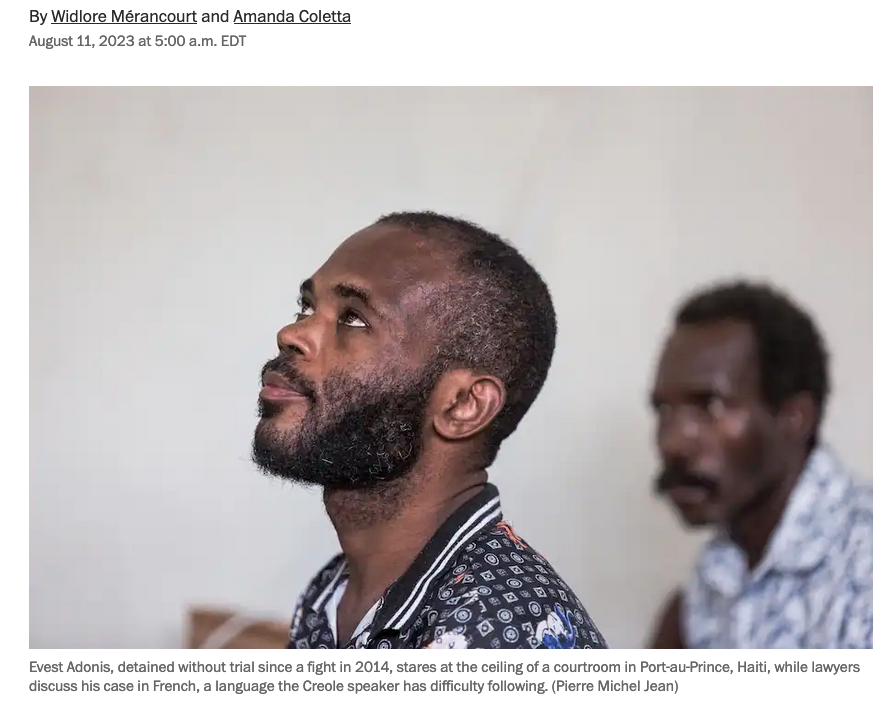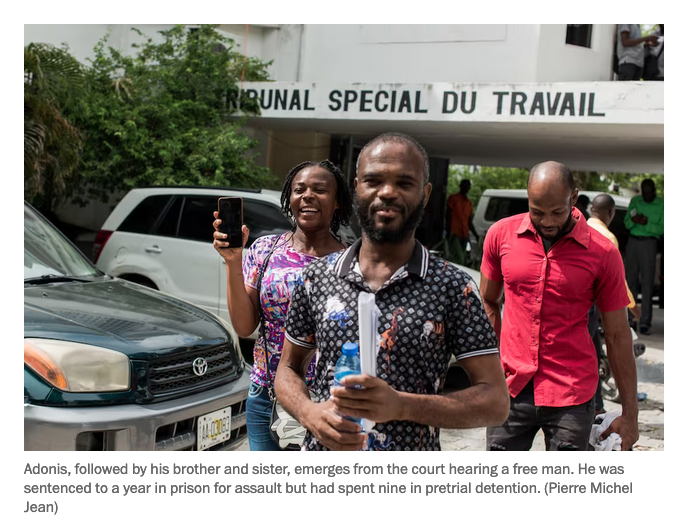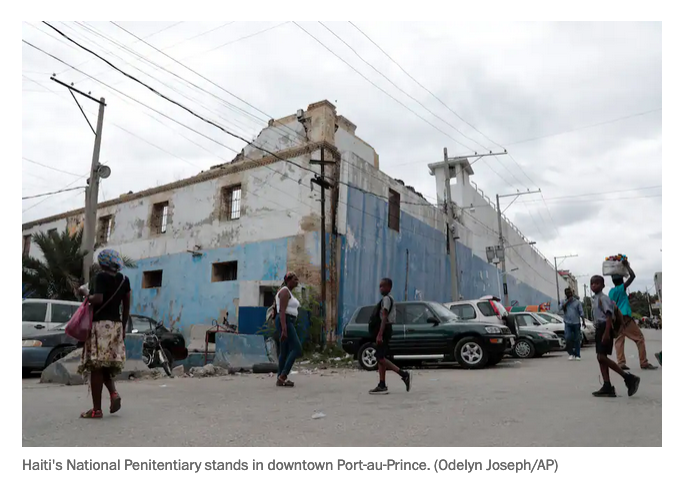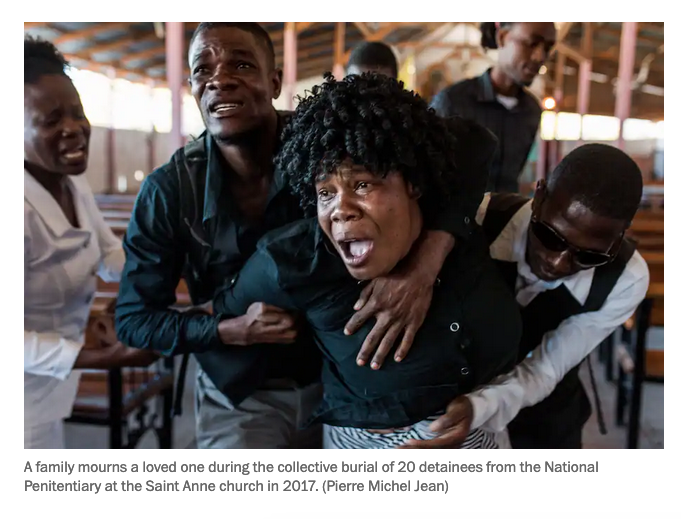His time in prison had spanned major moments in Haiti: The end of a divisive U.N. peacekeeping mission, massive anti-corruption protests, the assassination of President Jovenel Moïse. But also, his daughter’s first day of school and all but one of her birthdays.
Now Adonis sat in a 98-degree courtroom as lawyers argued in French about whether he should miss any more of them. A Haitian Creole speaker, he understood little of the hearing last month. Including the moment when Court of First Instance Judge Marthel Jean-Claude pronounced his sentence: One year in prison.
Jean-Claude switched to Haitian Creole to announce he would release Adonis. His time in pretrial detention had exceeded his sentence by more than eight years.
Then the judge addressed the defendant directly: “You spent too much time in prison,” he said. “Unfortunately, we’re not in a country where people are tried on time.”
Cases such as Adonis’s are common in Haiti, where lawyers and rights groups say the prison system is a black box, routinely holding suspects in pretrial detention for prolonged periods — often for longer than their potential maximum sentences — without charging or trying them.
Haiti’s prisons are the world’s second-most crowded, according to the Institute for Crime and Justice Policy Research at Birkbeck, University of London. Pretrial detainees make up more than 83 percent of the prison population, the U.N. office in Haiti said in May — the highest percentage in the Americas and among the highest in the world.
“We have a justice chain that is completely broken,” Fabio Pinzari, head of the office’s corrections section, told The Washington Post.
Neither Haiti’s justice ministry nor Prime Minister Ariel Henry’s office responded to requests for comment.
The problem is of a piece with the political instability and security crises buffeting the Caribbean nation, but it also long predates the surge in gang violence that has displaced 165,000 people here and drawn pleas from the government for international intervention.
Analysts blame the failures of the justice system on a dearth of mechanisms for monitoring and reporting abuses and a lack of political will to create them. Some judges face intimidation. Others misuse arrests to target foes or placate allies — with impunity.
“There is no one holding them to account when they don’t do their jobs,” said Jacques Letang, president of the Human Rights Office in Haiti, which provided pro bono legal aid to Adonis. “There is no justice without sanction.”
Haiti’s constitution requires officials to present people who are arrested to a judge within 48 hours. But in practice, analysts say, this rarely happens.
Compounding the problem are intermittent strikes by court workers. The expiration of Haiti’s elected government has stalled the appointment of judges. And as gangs have amassed power, they’ve attacked court buildings, torching files for which there are rarely digital copies and making it risky to hold trials.
Most affected, analysts say, are those who can’t afford lawyers, because they’re left to rely on the support of overburdened rights groups to raise their cases. But even those with advocates can struggle to make it out.
The dean of the Court of First Instance in Port-au-Prince issued a letter in 2021 freeing Patrice Sully from the National Penitentiary — but he has not been released. The order was issued in French.
“The paper says I should have been freed, but I’m not good in speaking French,” Sully told The Post, between sobs, in an interview at the prison last month. “I did not understand what was in it.”
On the day in July when guards summoned Adonis to court, they also yelled out Joel Saint Juste’s name. He is accused of criminal conspiracy — charges that he denies — and, like Adonis, has spent more time in pretrial detention than the maximum sentence for his alleged crime if he were convicted.
“I heard my name,” he told his lawyer in a meeting at the prison last month. “But they never arrived close to my cell.
“You need to be more attentive,” lawyer Miki Julien replied. He noted that Saint Juste had been “unlucky” because prison guards had ripped up an earlier summons to court. “If you hear ‘Juste,’ call them loudly. If you came, you’d be free.”
The U.N. office in Haiti and the U.N. human rights office in 2021 deplored conditions and prolonged preventive detention in the country’s prisons. In a report titled “N ap mouri” — “We are dying” in Haitian Creole, they said detainees were held in cells so cramped that some slept in makeshift hammocks hung from the ceiling, lacked access to health care and sanitation, and were abused by officials.
The prison system is “more a mechanism that generates acute suffering,” they reported, than a system that “executes ‘judicial decisions depriving of liberty in a safe, humane environment aimed at helping the offender become a respectful citizen of the law.’”
Conditions have since worsened.
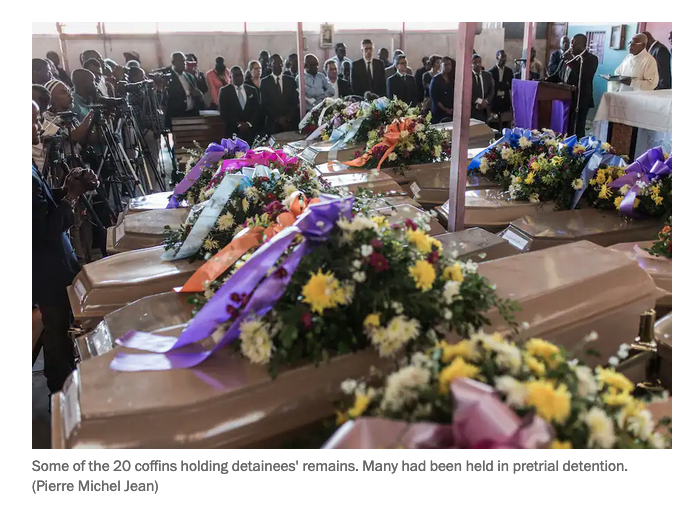 Researchers last year found that incarcerated men here are fed a “starvation-level” diet. There were 185 deaths in prison in 2022, the U.N. office reported, including 42 from cholera. That was up 26 percent from the previous year.
Researchers last year found that incarcerated men here are fed a “starvation-level” diet. There were 185 deaths in prison in 2022, the U.N. office reported, including 42 from cholera. That was up 26 percent from the previous year.
“The food is extremely bad,” Sully said, “but you have to eat it, so you don’t die.”
Detainees at the National Penitentiary told The Post that some prison authorities are charging starving inmates for bread, water and ice. They said inmates who are sick with cholera or tuberculosis are left in the general population, and medical help is slow to arrive if it comes at all.
“I cannot count how many people died in my cell,” Adonis told The Post. He said one was his best friend, Michelet, who succumbed last year to cholera. “One day, I woke up and touched him, and he was dead.”
Haiti’s National Human Rights Defense Network reported that a police station in Port-au-Prince in May had 92 detainees in two cells, each built to hold 10. One was a woman who was six months pregnant. She had not seen a doctor since her arrest in January.
Analysts say prison conditions present a security concern.
“There are so many cases of people who came to prison for petty crimes, but become big criminals because of the connections they make in the prison” and the “inhumanity” of their detentions, said Gédéon Jean, director of the Center for Analysis and Research in Human Rights in Port-au-Prince.
The U.N. offices said prison conditions here constituted a “situation of torture or cruel, inhuman or degrading treatment.” They called for “urgent” measures to safeguard the rights of detainees.
But at the National Penitentiary — a prison whose foul odors linger in visitors’ clothing long after they’ve left — a police officer told a Post reporter and two human rights lawyers in July that “there’s no such thing as human rights.”
Haiti’s justice ministry says reducing the number of defendants in pretrial detention is a priority. A new penal code that contains measures to address the issue is supposed to be implemented next year. That would be two years behind schedule.
In December, the justice ministry established a quota of cases that prosecutors must meet per month — or face administrative punishment. But analysts said it’s unlikely to make a difference without structural changes.
“The problem of prolonged preventive detention is far from being solved,” said Renan Hédouville, head of the Office of Citizen Protection in Haiti, a government watchdog.
Adonis called his detention “catastrophic.” A farmer from L’Asile in southwestern Haiti, he came to Port-au-Prince to study when he was arrested.
His family paid $1,100 — almost all they had — to a lawyer in 2014. They say he took the money and did nothing to help. The Human Rights Office in Haiti took on his case in 2017. They had to reconstitute a case file that was destroyed when gangs attacked a courthouse.
In the early years of his detention, Adonis’s parents visited to bring him food but eventually stopped because getting to the prison involved traveling through Martissant, a battleground for warring gangs.
Adonis walked out of the courthouse last month a free man. He’d have to find a job, he said, so he could feed his daughter. A baby when he was arrested, he was sure she would not recognize him.
As for the state that had held him for so long, he said, he wasn’t out for revenge.
“I’m just happy to be free,” Adonis said.
